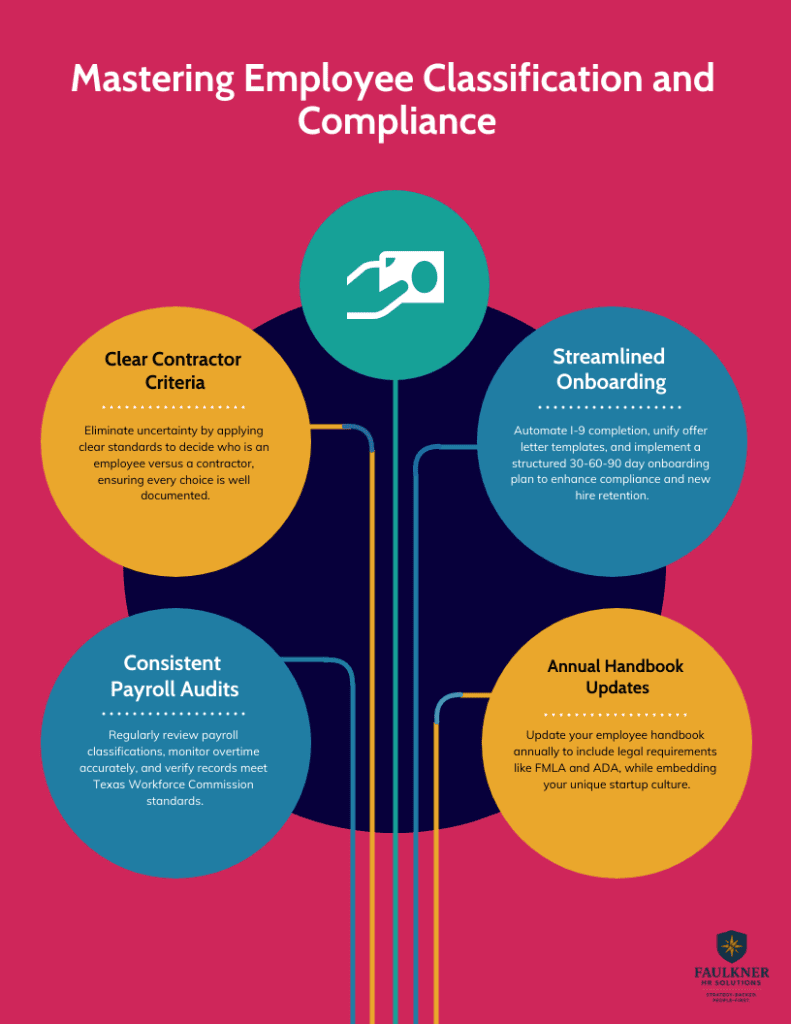Austin’s tech scene is booming, but behind the energy and venture capital, too many startups are stumbling over the same issue: HR compliance pitfalls. From misclassifying contractors to overlooking wage requirements, Austin founders often underestimate the risk until it’s too late. The result? Penalties, lawsuits, or worse—talent walking out the door.
Here’s the uncomfortable truth: broken HR systems cost more in turnover and inefficiency than it would to get them right the first time. If you’re scaling a startup in Silicon Hills, you can’t afford to treat compliance as an afterthought.
In this guide, we’ll break down the most common Austin tech HR compliance pitfalls, why they happen, and—most importantly—how to fix them.
Why Listen to Me
I’m Dr. Thomas Faulkner, founder of Faulkner HR Solutions. I consult with both private companies and public sector entities across Texas, helping fast-moving industries like tech keep their compliance house in order without slowing innovation. I hold a Doctorate in Business Administration, the SPHR certification, and a Lean Six Sigma Black Belt. More importantly, my work has helped organizations replace reactive, patch-work HR practices with systems that stand up in audits, reduce risk, and protect leadership from costly compliance mistakes.
In Austin’s tech scene, the pace is unforgiving—one misstep in wage and hour law, contractor classification, or workplace investigations can derail growth. That’s why my consulting focuses on practical, Texas-specific solutions that let companies scale with confidence.
The Top Austin Tech HR Compliance Pitfalls Startups Face
Startups rarely fail because of ideas. They fail because they ignore the people side of growth. Based on years of advising Texas companies, here are the most damaging HR compliance pitfalls plaguing Austin tech:
- Contractor vs. Employee Misclassification
Too many startups treat full-time staff as “1099 contractors” to save on payroll taxes. The Texas Workforce Commission isn’t impressed—and neither are investors doing due diligence. - Weak Hiring & Onboarding Processes
Job descriptions written on the fly, missing offer letters, no I-9 verification system—sloppy hiring practices put you on the radar for compliance audits. - Wage & Hour Mistakes
Austin tech companies often blur the line between “salaried exempt” and “hourly non-exempt.” When those long startup hours go unpaid, you’re one complaint away from a wage claim. - Neglecting Workplace Policies
Employee handbooks aren’t just paperwork—they’re your compliance safety net. Without them, disciplinary actions, harassment claims, and termination disputes escalate fast.
If you’re still borrowing policy templates off the internet, you’re leaving cracks big enough for penalties and lawsuits to slip through.
How to Prevent Austin Tech HR Compliance Pitfalls
Avoiding these pitfalls isn’t about adding red tape—it’s about building systems that scale with growth. Here’s how forward-thinking Austin founders are staying compliant and competitive:

- Build a Contractor Classification Framework
Stop guessing. Use clear criteria to determine who qualifies as an employee vs. contractor, and document decisions. - Systematize Onboarding
Automate I-9s, standardize offer letters, and implement a consistent 30-60-90 day plan. This boosts compliance and new-hire retention. - Audit Pay Practices Regularly
Review exempt vs. non-exempt classifications, track overtime, and ensure payroll records align with Texas Workforce Commission requirements. - Modernize Your Handbook
Update annually. Cover compliance essentials (FMLA, ADA, harassment prevention) but also weave in your startup culture.
Critical step most leaders miss: Employers think compliance stifles innovation. In reality, solid HR systems free founders to focus on scaling instead of scrambling after every complaint.
Frequently Asked Questions
The biggest pitfalls are misclassifying contractors, sloppy onboarding documentation, wage and hour violations, and outdated handbooks. Each one can lead to penalties or turnover if ignored.
Because many startups use contractors to stay flexible, but if those workers function like employees, the Texas Workforce Commission and IRS can reclassify them. That exposes companies to back taxes, penalties, and lawsuits.
At least annually—or immediately after major changes like funding rounds, rapid hiring, or shifting from contractors to employees. Compliance gaps multiply fast during growth spurts.
Yes. A well-written handbook protects against disputes and shows investors you’re serious about governance. Borrowed templates don’t cut it—your handbook needs to reflect Texas law and your company culture.
Beyond fines, the bigger cost is lost talent and credibility. Employees won’t stay where policies are unclear or paychecks feel unreliable. And investors hesitate to back startups with messy HR practices.
Leverage scalable systems—digital onboarding platforms, payroll software, and outsourced HR compliance audits. Even lean teams can stay compliant with the right tools and guidance.
No. In fact, it speeds growth by reducing distractions and risks. Strong HR systems let founders focus on scaling, not firefighting employee disputes or compliance audits.
Final Take
Austin tech startups are magnets for talent, capital, and opportunity. But none of that matters if your foundation is cracked by HR compliance failures. By addressing these pitfalls early, you protect your growth, your people, and your reputation.
Next Step Ladder:
- Download the HR Compliance Audit Checklist for Austin startups
- Schedule a compliance readiness consultation
- Explore services for scaling HR systems in Austin tech
Disclaimer: This guide is educational and not legal advice.